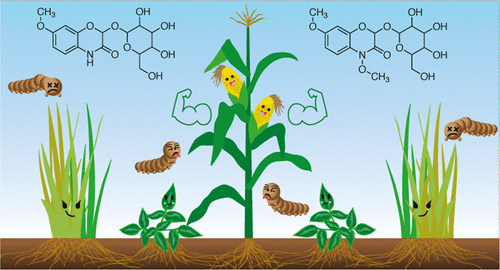Push–pull technology refers to a promising mixed cropping practice for sustainable agricultural intensification, which uses properties of intercrop and border crop species to defend a focal crop against pests. Currently, the most widely practiced system uses Desmodium spp. as intercrop and Brachiaria or Napier grass as border crops to protect maize (Zea mays) against both insect pests and parasitic weeds. Several previous studies have demonstrated the efficacy of the push–pull system, but research on the underlying chemical mechanisms has mostly been limited to laboratory and glasshouse experiments that may not fully reproduce the complexity of the system under natural conditions. To address this limitation, we performed a large-scale study in farmer-operated push–pull maize fields in three east African countries. We compared maize leaf extracts from plants grown on push–pull fields with maize from fields employing conventional agricultural practices to assess the influence of push–pull cultivation on the maize metabolome. We identified two benzoxazinoid glycosides, which are known to have antiherbivore properties and were present in greater relative abundance in push–pull-cultivated maize leaves across three countries. Our data thus suggest that maize cultivated under push–pull has an increased resistance to herbivore attack compared to maize grown under conventional local agricultural practices.
Authors: Jakob Lang, Sergio E. Ramos, Linus Reichert, Grace M. Amboka, Celina Apel, Frank Chidawanyika, Andargachew Detebo, Felipe Librán-Embid, David Meinhof, Laurent Bigler and Meredith C. Schuman
Contact address: jakob.lang@uzh.ch
Institution: University of Zurich
Twitter name of the institution: @UZH_en
Twitter link: https://x.com/UZH_en
Available downloads:


